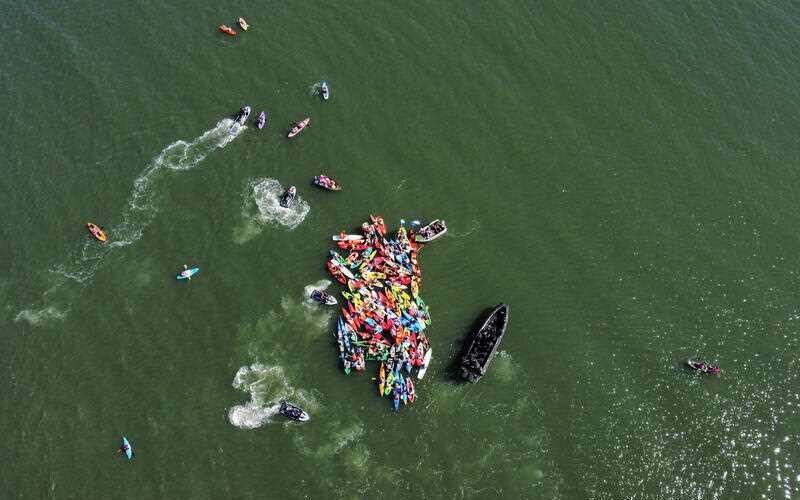Sixteen Rising Tide protesters who were arrested in a peaceful blockade of Newcastle Coal Port on Sunday were held in custody until they agreed to oppressive and unclear bail conditions. Wendy Bacon reports.
Only after they agreed to the conditions were protesters released in the early hours of Monday morning. The conditions that have been described by the NSW Council for Civil Liberties as ‘scandalous’ and “undemocratic” will be challenged in court by the Environmental Defenders’ Office (EDO), which is applying for a variation of bail conditions.
The restrictive conditions are of a kind designed for serious organised criminal activity, not peaceful protesters. Rising Tide protesters have even been required “not to associate” with any “issue motivated group” that includes ‘Cop 28’, the global climate change conference that is being held in Dubai where governments will negotiate how to avoid 3C catastrophic warming that scientists are predicting unless there is an immediate and dramatic decrease in fossil fuel production.
Those the police refused to release unless they signed the onerous agreement had previous protest convictions. This means that if police decide conditions have been breached, they could arrest protesters and return them to custody. About 80 protesters who did not have convictions were released and will return to court in January. Two others who refused to sign the conditions stayed in custody overnight, pleaded guilty and were fined on Monday.
The price of peaceful protest: 109 arrests, but the Newcastle Port blockade will be on again
MWM spoke to Bronwyn Vost, a 74-year-old woman who is an active member of Knitting Nannas, a network of older women who carry out peaceful environmental protest actions on a regular basis. She joined the People’s Blockade and was amongst 350 protesters who had kayaked on the water overnight. Like all those arrested, she refused to leave the river channel after being directed to do so by police after 4 pm on Sunday. She was charged with an offence under the Maritime Service Act for which the maximum penalty is a fine. (The protesters were not charged under the new protest laws which carry heavier penalties.)
Onerous bail conditions
Vost’s conditions state that she is to be “of good behaviour” and not commit more offences, which is not unusual. But the conditions go much further and state that she is “not to undertake or attend any training, recruitment sessions or participate in the planning of unlawful protest activity.”
A separate, even broader paragraph states she is “not to associate or engage in any planning, training, recruitment sessions or coordinating activities with any protest group or any issue motivated group including but not limited to Rising Tide, Blockade Australia, Cop 28 and Extinction Rebellion. This includes (and is not limited to) in the form of any communication whether written, oral, electronic (via telephone, text message email, Internet application of social media) or communication through any third-party.”
These broad and unclear conditions are part of a developing NSW policing strategy aimed at suppressing peaceful protests by attempting to stop protesters from associating with each other, even through social media, and encouraging political activists to believe they are under constant surveillance.
It is unclear whether the conditions apply to ‘unlawful protests’ or ‘protests’ of all kinds. In any case, there is really no such thing as an ‘unlawful protest’. In Australia, protests are legal unless specific offences are committed.
Vost told MWM, “The police don’t seem to be differentiating between lawful and unlawful protest activity. It seems that to them, it is all unlawful by definition. I am very upset by the imposition of these conditions. A big part of my life is taken up with environmental activism of one sort or another with the Knitting Nannas.
The great majority of this activism is perfectly legal things like researching and writing letters, lobbying politicians or raising public awareness. I believe that I am bettering society and making a liveable planet more likely for my grandchildren. This activity is becoming more urgent every year as the threat of environmental collapse becomes ever more real. It is very onerous to be separated from my friends in the Nannas and from other like-minded people by these conditions.”
Police overreach?
NSW Civil Liberties Council (NSWCCL), the NSW EDO and other civil rights lawyers have been complaining about police use of these sorts of conditions for at least four years. Rather than heed their concerns, the NSW police have developed even broader conditions. In the case of the Rising Tide People’s Blockade, they have attempted to isolate the activists from the entire climate action movement rather than barring association with lists of up to 40 specific individuals as they did during the Blockade Australia protests last year.
As we publish this article, four days of peaceful protesting to encourage strong action at Cop28 is beginning in Sydney, with banner painting underway at a Marrickville community centre to produce a striking visual display at a rally on Sunday at Sydney’s Bellmore Park. The bail conditions have left Vost and other protesters unclear as to whether they have signed conditions that prevent them from participating in the Cop28-related activities or not.
NSWCCL President and lawyer Lydia Shelly described the conditions as ‘scandalous’, She is concerned that police are misusing bail to disrupt and monitor protest movements and “arguably, as a matter of convenience – which are not the legitimate grounds for imposing onerous bail conditions.” She said similar onerous bail conditions have already been criticised by magistrates in Local Courts across Sydney.
“The police bail conditions that are …often more onerous than [for] alleged criminal offences involving domestic violence or other conduct that involves violence. That clearly reflects the attitudes that NSW Police may have with respect to protest matters. It is worrying that members of NSW Police feel emboldened to misuse bail in this way. It is undemocratic ….”
“CCL is concerned that the condition isolates protesters and impacts on their civil liberties and constitutional rights to political communication. “NSW Police, by adopting this scandalous use of bail, is bypassing important “checks and balances” that are otherwise part of the criminal justice system that seeks to prevent the targeted use of bail or, arguably, the politicisation of the police force,” said Shelly.
Legal observers arrested
In another move that signals a tougher policing strategy, two people clearly identified as legal observers who were not participating in the protest were arrested on Sunday night. Legal observers are recognised as Human Rights Defenders by the Office of the United Nations High Commissioner for Human Rights. They perform tasks like informing people about their legal rights, and record interactions by taking notes, photos or videos.
This is not the first time that observers have been arrested. Anxious to resolve this matter, CCL has written to the NSW Police Commissioner Karen Webb requesting a meeting. The Council wrote, “It is imperative that NSW Police are informed of the role of independent Legal Observers and that this is the last time that NSW Police arrest Legal Observers during the course of their observing at a protest.” NSW Police have acknowledged their letter but have not yet agreed to meet.
Will repressive policing work?
Given that lawyers expect the courts to remove the repressive and vague conditions, the process can be seen as a waste of police and legal resources, apart from being unjust.
It is also unlikely it achieve its goal of intimidating activists from continuing to commit acts of civil disobedience, especially in the light of grim predictions of ever more catastrophic impacts of global warming.
Rising Tide claims the People’s Blockade was an exciting and inspiring success in which 3000 people participated in a well-organised grassroots action. Part of the successful strategy was giving everyone a way to contribute – from performing to cooking – so that not everyone needs to be prepared to be arrested. Yesterday, Rising Tide tweeted, “We’re planning for 10,000 people at a day-long #PeoplesBlockade event next year.” New supporters are joining local social media groups and contributing to legal funds.
In response to a question about the group’s future intentions, spokesperson Zach Schofield said, “Instead of building and utilising political capital to take on the fossil fuel industry, our governments prefer to hand off climate policy to the police, in the form of restrictive bail conditions and anti-protest laws designed to discourage everyday people from taking action. … the right to protest must be constantly reaffirmed by engaging in strategic, disruptive protest, which targets the fossil fuel industry and the politicians that support it.”
“It’s the job of government to ensure industry works for our citizens, not in contempt of them.”
If our government fails in that duty to protect my generation against the greed of the coal and gas barons, we have a duty to stand up – because unionists, suffragettes, and civil rights campaigners fought and died for our right to do so.
Coal from Newcastle. The port blockade that aims to stop it.
Wendy Bacon is an investigative journalist who was the Professor of Journalism at UTS. She worked for Fairfax, Channel Nine and SBS and has published in The Guardian, New Matilda, City Hub and Overland. She has a long history in promoting independent and alternative journalism.
She is a long-term supporter of a peaceful BDS and the Greens.

